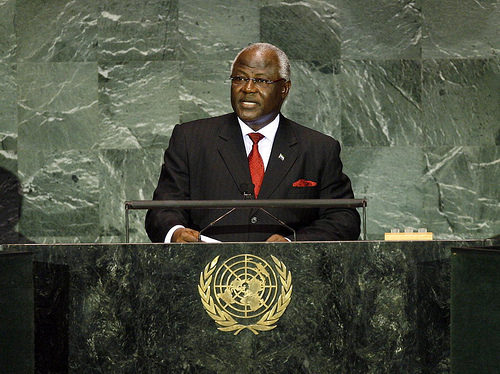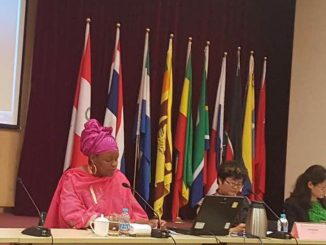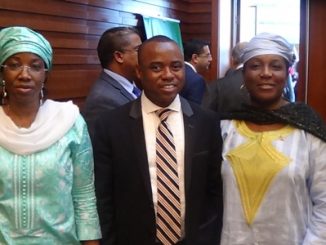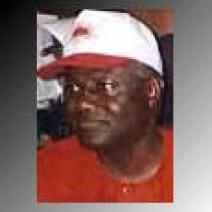
By KABS KANU :
Since President Ernest Bai Koroma came to power in 2007, one of his landmark achievements has been his remarkable respect for fundamental human rights. As Sierra Leone goes into crucial elections this week, President Koroma, who is seeking re-election for a second term, has the impressive distinction of being the only Head of State in the post-Independence history of the nation who has never carried out political witch hunts, stage-managed treason trials and their attendant execution or imprisonment of citizens; he has never ordered search and seizures operations in newspaper offices, nor has any journalist been ever arrested in Sierra Leone for expressing his/her views, though there are over 50 newspapers with one-third of them being opposition media which lambast the government every day; Sierra Leone has no political prisoner or a prisoner of conscience. Religious tolerance reigns throughout the land. Sierra Leone now has one of the most vibrant and eloquent civil society and women’s groups in Africa.
PRESIDENT KOROMA ADDRESSING THE UN GENERAL ASSEMBLY; IN ADDITION, HE IS THE COORDINATOR OF THE C-10 , THE COMMITTEE THAT ADVOCATES AND PROMOTES THE AFRICAN COMMON POSITION IN THE UN SECURITY COUNCIL REFORM NEGOTIATIONS
Therefore when Sierra Leone decided to vie for a seat in the highly respected UN Human Rights Council –One of the most important arms of the UN–her candidacy received the utmost acclaim it deserved within the corridors of the UN and yesterday during important elections at the UN General Assembly, Sierra Leone won , scoring one of the highest votes . The importance of our nation serving in the UN Human Rights Council cannot be over-emphasized. It is a major diplomatic VICTORY for a country that went through the most bloody civil war in Africa during which rebel forces amuputated the limbs of innocent children, women and men and killed nearly 50, 000 people. Within a short pace of time after the war ended , ESPECIALLY DURING THE REIGN OF PRESIDENT KOROMA, Sierra Leone has transformed into one of the world’s bastions for respect for fundamental human rights and one of the most stable and peaceful nations. This was the reason that her candidature was not only taken seriously but she was duly elected into the hallowed council.
Sierra Leone now has a big voice in the promotion of respect for fundamental human rights in the world and UN diplomats stated yesterday that the country deserves it. This achievement alone is enough to give President Koroma victory at the polls for had it not been for the President’s immaculate respect for human rights, the country’s candidacy would not have been taken seriously. This is a major achievement all Sierra Leoneans should applaud, irrespective of their political affiliations because it has enhanced and dignified our international stature.
BELOW IS A REPORT ON THE ELECTIONS BY THE UN NEWS SERVICE :
General Assembly elects 18 countries to serve on UN Human Rights Council
 Voting in the General Assembly to elect 18 members of the UN Human Rights Council. UN Photo/Rick Bajornas
Voting in the General Assembly to elect 18 members of the UN Human Rights Council. UN Photo/Rick Bajornas12 November 2012 – The General Assembly today elected 18 countries to serve on the United Nations Human Rights Council (HRC) for a period of three years beginning on 1 January 2013.
Argentina, Brazil, Côte d’Ivoire, Estonia, Ethiopia, Gabon, Germany, Ireland, Japan, Kazakhstan, Kenya, Montenegro, Pakistan, Republic of Korea, Sierra Leone, United Arab Emirates, United States and Venezuela were elected by secret ballot during the elections held at UN Headquarters in New York.
Members of the Council serve for a period of three years and are not eligible for immediate re-election after serving two consecutive terms.
The Council, composed of 47 members, is an inter-governmental body within the UN system responsible for strengthening the promotion and protection of human rights around the globe and for addressing situations of human rights violations and make recommendations on them.
All of its members are elected by the world body’s General Assembly, and it has the ability to discuss all thematic human rights issues and situations that require its attention throughout the year. It meets at the UN Office at Geneva.
The Council’s membership is based on equitable geographical distribution and seats are distributed as follows: 13 seats for African States, 13 seats for Asian States, 8 seats for Latin American and Caribbean States, 7 seats for Western European and other States, and 6 seats for Eastern European States.
The other members of the Council and the end of their terms are as follows: Angola (2013), Austria (2014), Benin (2014), Botswana (2014), Burkina Faso (2014), Chile (2014), Congo (2014), Costa Rica (2014), Czech Republic (2014), Ecuador (2013), Guatemala (2013), India (2014), Indonesia (2014), Italy (2014), Kuwait (2014), Libya (2013), Malaysia (2013), Maldives (2013), Mauritania (2013), Peru (2014), Philippines (2014), Poland (2013), Qatar (2013), Republic of Moldova (2013), Romania (2014), Spain (2013), Switzerland (2013), Thailand (2013) and Uganda (2013).




Leave a Reply